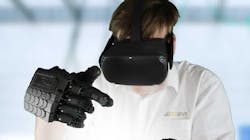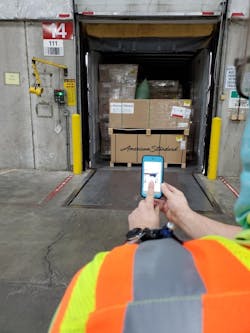Innovation Lab Helps Small Manufacturers Grow
Sometimes having an idea isn’t enough. Sometimes a small company needs a boost to bring its product to those that need it most.
That’s what happened to Smart Gladiator LLC, a manufacturer of wearable scanning technology, based in Atlanta. Puga Sankara founded the company after he saw the need to improve the process of how companies were tracking their inventory.
“Workers need a user-friendly, comfortable way, to track products in the distribution centers,” says Sankara. “With the volume coming through these centers and workers having to lug around heavy components that disrupted their workflow, wearables offer a great solution.”
So, in 2013, he created a company and set up shop at Technology Square which is located in Atlanta. According to Georgia Tech, this area has the “highest density of startups, corporate innovators, and academic researchers in the entire southeastern United States. “ By locating there, the company had access to many useful resources much needed by a start-up company.
Further help came from the Georgia Centers of Innovation, which is a division of the Georgia Department of Economic Development. This program has five different centers, including one focused on manufacturing and another on logistics. It was the logistics one that offered assistance to Smart Gladiator by featuring the company in its early days at the Technology Showcases that were part of the Georgia Logistics Summit. In fact, Puga was a speaker at one of those sessions.
“When we were rolling out our product the Center was very helpful in allowing us opportunities to present our technology," says Puga. “Without their help, we wouldn’t be where we are today.”
Today the company has expanded its capabilities. In addition to the wearables, the company now manufactures tablets, truck mounts and handheld devices. And they have a software division as well.
This growth has attracted well-known companies such as Bosch, Kohler, Komatsu and Stryker who are customers.
Growth is continuing for the company that has transferred the lesson of collaboration it learned in its early years to collaborating with customers who are often the source of new product ideas.
Another high-tech company, VRgluv, was also the beneficiary of assistance from the state of Georgia.
Its path began when the CEO of VRgluv, Chris Taylor, won the Georgia Tech InVenture Prize in 2013. He then became part of a group of engineers involved with a start-up incubator within the company KickrDesign. The group developed the product at KickrDesign and in 2017 broke away as its own company. And as the company grew it received assistance from the Georgia Centers for Innovation while it was developing products and markets.
The company produces real-time precision hand and finger tracking technology that is occlusion and drift-free and is able to match the natural movements of hands and fingers. The glove has haptic feedback sensors that react with virtual reality (VR) devices. A user can actually “feel” the objects that they are seeing.
One of the best use cases for the technology is in training. “The application of VR in training is an effective and way for small businesses to both quickly train people and see a strong return on investment, explains Taylor. “It’s hard for small businesses to develop in-house VR capabilities.”
Training is a huge challenge in many industries due to both high-turnover and the inability of capturing knowledge before workers retire. The VR glove offers an intuitive way to transfer that knowledge as procedure memory is boosted by muscle memory.
Taylor provides an example from the defense world. As the Air Force has some of the top maintenance people in the world, the procedure is to fly these experts around the world when things need to be repaired. With this technology, the glove can both record and simulate the procedures placed into the system by these experts. “With this type of problem-solving available it doesn’t make sense to fly people around the country anymore, and this is especially true due to the pandemic,” explains Taylor.
Taylor sees many future applications and is currently developing customized solutions for a variety of sectors including military, medical, government, and others.
These two companies, and others in the VR sector, were able to grow within an ecosystem that is supported by the state as this sector is a targeted growth area for Georgia. And as this technology will continue to evolve so will the role of the Georgia Centers of Innovation. In addition to being a resource for collaboration, they are moving toward grants. “The Georgia Centers of Innovation are beginning to work with manufacturing companies to turn pilot projects into reality through innovation grants and partnerships,” says Alyssa Rumsey, senior industry engagement manager at the Georgia Centers of Innovation for Manufacturing.

